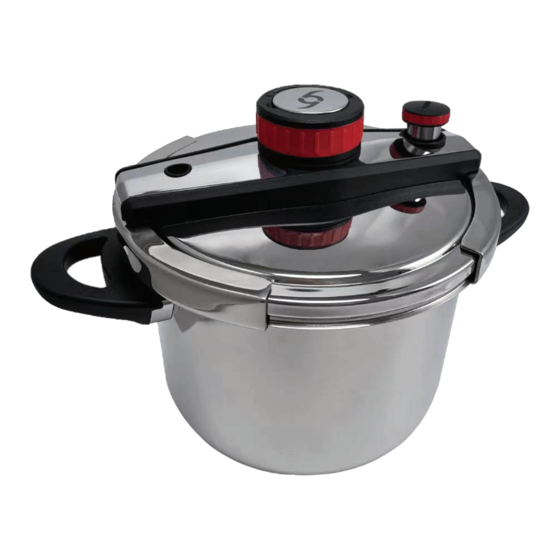
Table of Contents
Advertisement
Quick Links
Advertisement
Table of Contents

Summary of Contents for Bogner BPC06L-2
- Page 1 USER’S MANUAL 6.3 quarts Stainless Steel Pressure Cooker BPC06L-2...
-
Page 2: Table Of Contents
Index Structure and Specifications 2. Important Safety Information 4 - 5 3. First Use 4. Safety Devices 5. Special Features 9 - 11 6. How to use 7. Trouble shooting 8. Cleaning and Maintenance 9. Questions and Answers 10. Cooking tips & times... -
Page 3: Structure And Specifications
Structure Handle Safety ring Safety window Screw Pressure limiting valve Security valve Body Lid handle Specifications ITEM NO. BPC06L-2 DIAMETER 8.66 inches CAPACITY 6.34 quarts WORKING PRESSURE 100 Kpa FIRST SAFETY PRESSURE 120-160 Kpa 180-300 Kpa SECOND SAFETY PRESSURE... -
Page 4: Important Safety Information
Important Safety Information 1. Read all instructions. 2. The appliance is not intended for use by persons (including children) with reduced physical, sensory, or mental capabilities, or lack of experience and knowledge, unless they are under supervision or have been given instructions regarding the use of the appliance by a person responsible for their safety. - Page 5 9. Extreme caution must be used when moving a pressure cooker containing hot liquids. Do not touch hot surfaces. Use the handles. 10. Do not open pressure cooker until the unit has cooled and all internal pressure has been released, air vent/cover lock has dropped, and no steam escapes when the pressure regulator is removed.
-
Page 6: First Use
First Use THIS PRODUCT IS FOR HOUSEHOLD USE ONLY Your pressure cooker is like a saucepan in which steam is sealed inside creating pressure within the unit. Under pressure, internal temperatures in the cooker are raised above the normal boiling point of water, causing foods to cook faster. -
Page 7: Safety Devices
Safety devices We have designed and equipped multi-devices for safety: · The open-preventing device ensures the lid to be closed properly as well as safely. · The three-degree pressure-releasing device ensures the lid closes properly. 1.Pressure-limiting valve: According to requirement select high pressure setting or low-pressure setting. -
Page 8: Special Features
Special features The encapsulated bottom of the pressure cooker is made to be strong and reliable; it is thicker than most products, which makes the cooker absorb heat faster. 2. Your appliance has been equipped with special pressure-limiting features to avoid blockage. Safety valve: will automatically check the inside pressure. -
Page 9: How To Use
How to use To open and close Open: As soon as the pressure cooker has cooled off, turn the knob anticlockwise and open the lid. (Fig. 6) Please operate carefully and preferably wear gloves to avoid the risk of burns. 2. - Page 10 Heating To raise the temperature quickly, heat the cooker on strong fire until the safety valve begins to work. Pay attention not to use stronger fire than needed. It is normal that a little steam seeps from the safely open-preventing valve after heating for a while. There should be no steam leaks after the valve rises and the pot works normally.
- Page 11 Turning off fire, releasing pressure and opening the lid Two ways to open the pressure cooker after cooking is done: 1. Natural cold. When heating time is up, turn off the fire and let it rest for a while, waiting for the pressure to be reduced. Wait until the safety valve goes down to open and take the lid off.
-
Page 12: Trouble Shooting
Trouble shooting If any problem emerges, you shall turn off the fire immediately and take the cooker to a level place and rinse the cooker with water slowly to reduce the temperature and the pressure. Find the reason and solve the problem with the table below. -
Page 13: Cleaning And Maintenance
Cleaning and Maintenance To ensure the correct operation of your pressure cooker, follow these cleaning and maintenance recommendations after each use: • Wash the pressure cooker after each use using water with a little mild liquid soap. • or your first-time use – after cleaning, fill with water and heat it up to get rid of any residual smell. - Page 14 Caution: Don’t lose small parts such as pressure-limiting valve. There is no problem if the color of the sealing ring changed. It is recom- mended to change the sealing ring once every one or two years according to the frequency of use. But it must be changed immediately if there is any damage or if it changes its shape.
-
Page 15: Questions And Answers
Questions and Answers 1. Q: What can be done if the food prepared in the pressure cooker has more liquid than desired? A: With the cover removed, simmer to evaporate the excess liquid. 2. Q: How does one calculate cooking times? A: Remember to begin timing as soon as the pressure regulator begins to rock gently. -
Page 16: Cooking Tips & Times
Cooking Tips & Times Defrost frozen ingredients before cooking. 2. Brown meats, poultry, and even some vegetables — like chopped onions, peppers, or carrots — first and then deglaze the pot for more intense flavor. 3. Don’t overdo the liquid. Because food cooks in a closed, sealed pot when cooking under pressure, you have less evaporation and should therefore use less cooking liquid than when cooking in a conventional pot.




Need help?
Do you have a question about the BPC06L-2 and is the answer not in the manual?
Questions and answers